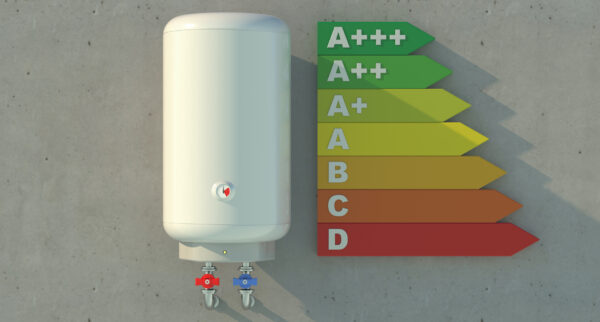Call us today 0207 32 32 999
Biomass boilers have recently gained popularity as a sustainable and eco-friendly alternative to traditional fossil fuel-based heating systems. These boilers are known for their range of environmental benefits.
But how exactly do they work, and why should you consider using one for your heating needs?
In this guide, we will explore the inner workings of biomass boilers, the different types of biomass fuels they can use, and the numerous advantages they offer over fossil fuel-based alternatives.
What is a Biomass Boiler?
A biomass boiler is a type of heating system that uses organic materials, typically derived from plants and trees, as fuel to generate heat and hot water.
These organic materials, collectively known as biomass, can include wood chips, wood pellets, agricultural residues, and even dedicated energy crops like miscanthus and switchgrass.
The key components of a biomass boiler include a combustion chamber, a heat exchanger, a fuel storage system, and controls to regulate the combustion process.
The combustion chamber is where the biomass fuel is burned to produce heat, while the heat exchanger transfers this heat to water or another heat transfer fluid, such as glycol. The heated fluid is then circulated to provide space heating or domestic hot water.
How Does a Biomass Boiler Work?
Now, let’s dive into the working mechanism of a biomass boiler:
Fuel Feeding
Biomass fuel, typically in the form of wood chips or pellets, is stored in a hopper or storage silo adjacent to the boiler. An auger or conveyor system delivers the fuel to the combustion chamber as needed.
Combustion
Inside the combustion chamber, the biomass fuel is ignited. The combustion process releases energy in the form of heat, which raises the temperature within the chamber.
Heat Transfer
The heat generated in the combustion chamber is transferred to the heat exchanger. This is typically a coil or series of tubes through which water or a heat transfer fluid flows. As it passes through the heat exchanger, the fluid absorbs the heat energy, raising its temperature.
Distribution
The heated fluid is then pumped or circulated to the areas where it is needed for heating purposes. In residential applications, this can be radiators, underfloor heating systems, or domestic hot water tanks.
Exhaust
After the heat is transferred, the combustion gases, including any particulates or pollutants, are expelled from the boiler through a flue or chimney. In modern biomass boilers, advanced emission control technologies may be used to minimise environmental impact.
Control and Regulation
Biomass boilers are equipped with sophisticated control systems that ensure optimal combustion and boiler efficiency. These systems monitor factors such as fuel feed rate, temperature, and oxygen levels to optimise performance.
Biomass Boiler’s Fuel Types
Biomass boilers can utilise a variety of organic materials as fuel. The choice of fuel type depends on factors such as availability, cost, and specific application.
Here are some common biomass fuel types used in biomass boilers:
Wood Chips
Chipped wood, often sourced from forestry residues or dedicated energy crops, is a widely used biomass fuel. It is suitable for larger-scale heating systems.
Wood Pellets
Wood pellets are a highly processed and densified wood fuel. They are convenient to store and handle, making them suitable for both residential and commercial applications.
Agricultural Residues
Crop residues like straw, corn stalks, and nut shells can be used as biomass fuel, especially in agricultural areas.
Energy Crops
Dedicated energy crops like miscanthus and switchgrass are grown specifically for biomass energy production. They can provide a consistent and sustainable source of fuel.
Benefits of a Biomass Boiler
Using a biomass boiler offers several benefits, making it an attractive choice for many homeowners and businesses:
Environmental Sustainability
Biomass is a renewable resource, and its combustion releases carbon dioxide (CO2) that was recently absorbed from the atmosphere by the plants.
This results in a relatively low net increase in atmospheric CO2 levels compared to fossil fuels.
Cost Savings
Biomass fuel is often less expensive than fossil fuels, providing potential long-term cost savings on heating.
Energy Independence
Using locally sourced biomass fuels reduces dependence on imported fossil fuels, enhancing energy security.
Government Incentives
Many governments offer incentives, subsidies, and tax credits to promote the adoption of biomass boilers, making them a financially attractive choice.
Low Emissions
Biomass boilers can be equipped with advanced emission control technologies, reducing air pollutants and minimising their environmental impact.
Are Biomass Boilers Better for Countryside Residences?
Biomass boilers are an environmentally friendly heating solution that can significantly reduce the carbon footprint of households in the countryside.
These types of boilers are better suited for households in rural areas, as you may need permission from your local authority in many cities.
So, why are they better suited for countryside households?
Abundant Fuel Supply
Rural areas often have easier access to the biomass materials needed to fuel these boilers, such as wood logs, chips, or pellets.
This can make running a biomass boiler more cost-effective and sustainable, as transportation costs and carbon emissions from fuel delivery are minimized.
Space Requirements
Biomass boilers and their fuel storage can require more space than conventional heating systems.
Homes in the countryside typically have more available space to accommodate these systems, including the larger fuel storage areas needed for efficient operation.
Heating Efficiency for Larger Properties
Biomass boilers are particularly effective for heating larger properties common in rural areas, where central heating efficiency can be challenging with conventional systems.
Reduced Heating Costs
For those living in areas without access to mains gas, biomass boilers can offer a cheaper and more environmentally friendly alternative to heating oil or electric heating systems.
Environmental Impact
People living in the countryside often choose biomass boilers to reduce their environmental impact. By using locally sourced, renewable biomass fuel, they can decrease their carbon footprint and contribute to a more sustainable local economy.
Get More Advice on Biomass Boilers
If you’re considering installing a biomass boiler for your home or business, seeking professional advice is essential to determine the right system for your needs.
Contact us today to get more information on biomass boilers.





